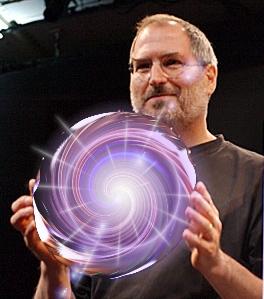This article is more than 1 year old
When 'God Machines' go back to their maker
All that glitters doesn't stay sold
Comment The genius of Apple's strategy for its iPhone is to make a defensive move look like an offensive one.
It's a prudent safety measure - like adding a safety bolt to the back door. Only, thanks to an American press corps that longs for escapism, it looks like a Blitzkreig.
Imagine if Apple hadn't created this newest addition to its iPod family. Financial analysts would be beating the company up, just as they have for the past couple of years, for failing to meet the challenge of music on mobile phones. Only louder.
Most mobiles have the potential to play music adequately these days - and some, particularly Sony Ericsson's handsets, do it very well. Analysts have been warning Apple for years that the iPod risked going the way of the starting handle after the invention of automatic ignition.
Instead, Apple has the handset manufacturers running around like headless chickens - and the network operators nervous. As a happy consequence, Apple itself has had free publicity worth millions for what is really a premium, high-margin addition to its iPod product line (iSuppli pegs the iPhone margin at over 50 per cent, which suggests Apple netted $350m of revenue in a weekend's business. Ker-ching!).
That shows the power of marketing - when you have a press pack only too willing to be manipulated. This is no accident, for the hype is central to Apple's tactics - much as it was when it launched the iTunes Music Store in 2003.
The idea is to create the illusion of unquenchable demand, so Apple can drive better deals with its suppliers (in the case of the iTunes store, the record labels) or network partner (in the case of the iPhone, the carriers).

"And this...is the future of mobile phones."
In each case, Apple casts the spell that this is a partnership the supplier, or partner, can't possibly live without. In fact, as the record labels have discovered, and the network partners will soon find out, these are deals they very much can live without.
All that glitters doesn't stay sold
The name "God Machine" gives you an idea of the scale of how much is missing from some people's lives - a yawning void they want to be filled by a piece of consumer electronics. But now that these machines are beginning to shuffle back to their maker (returning the product within 14 days of purchase may cost you $111.87- but saves you over $2,000 in operator fees) - it's time to ask some serious questions.
iPhone is perhaps not the emphatic "must have" gadget Apple's cheerleaders in the US press may have wished for.
The amazing multi-touch interface dazzles, in the way that a bright shiny object might dazzle a child. But as our own Cade Metz pointed out, it actually makes some tasks more tedious.
Over at PalmInfocenter, Tim Carroll compares the steps against a Treo, here, before advising Apple to "employ a tap counter".
In truth, the only four killer applications for the mobile phone are (in order); voice, voice, voice, and SMS. And if you make any of these more difficult for people to use than they should be, the manufacturer should have a very good Plan B. And here, Apple runs into the same wall as Nokia, and every other phone manufacturer.
